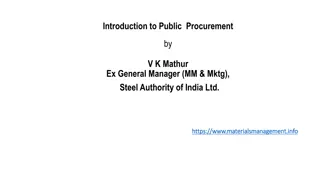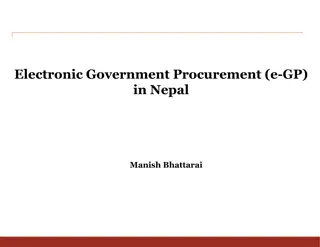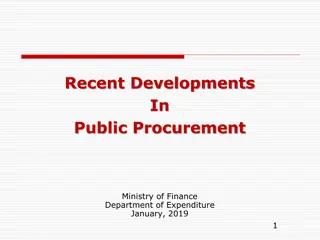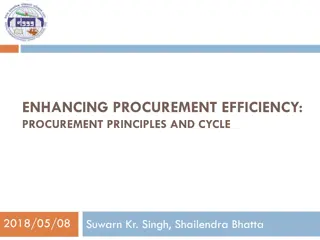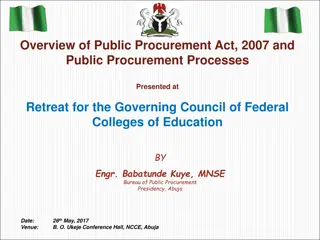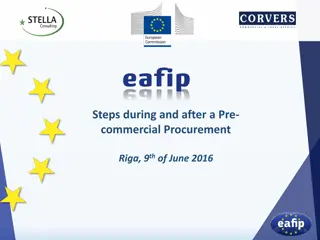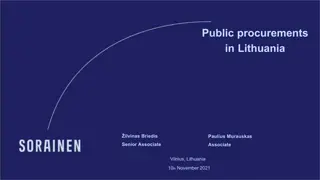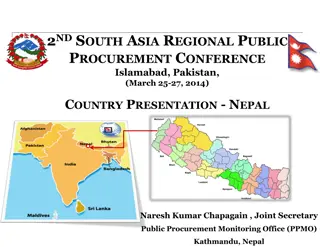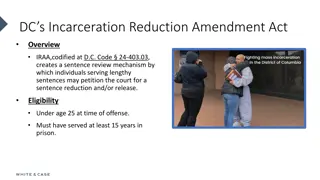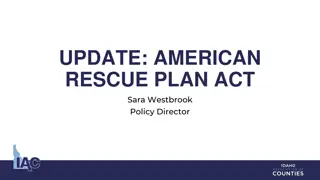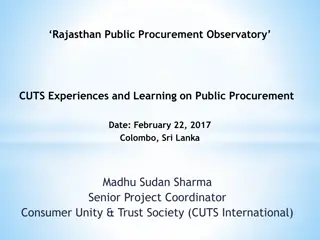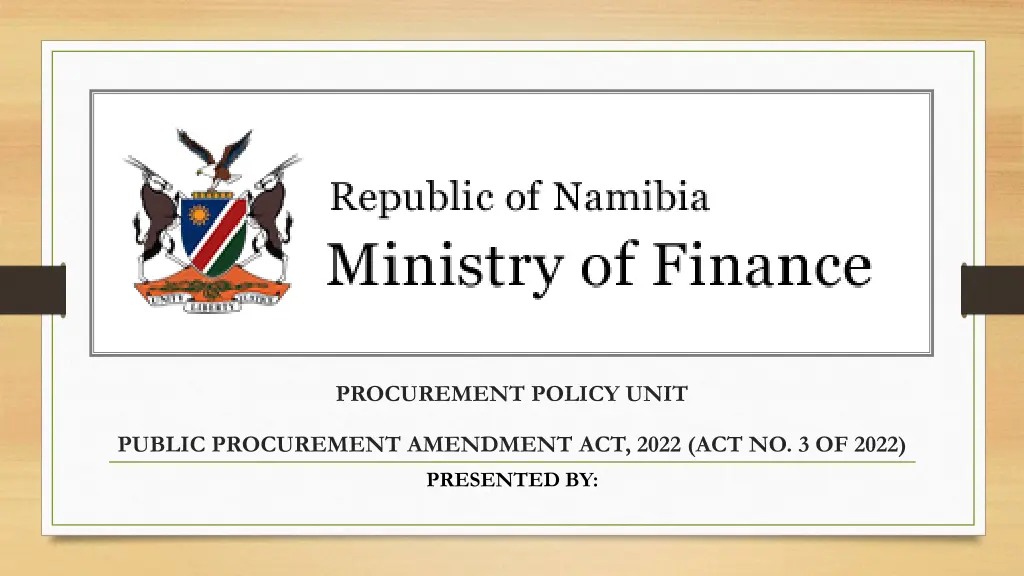
Amendment Act 2022: Public Procurement Policy Unit Overview
Explore the key amendments introduced by the Public Procurement Amendment Act, 2022 (Act No. 3 of 2022), focusing on definitions, procurement policy units, powers of accounting officers, bid evaluation committees, procurement methods, bid openings, awards of contracts, and more. Understand the commencement details and implications of the updated sections for public entities.
Download Presentation

Please find below an Image/Link to download the presentation.
The content on the website is provided AS IS for your information and personal use only. It may not be sold, licensed, or shared on other websites without obtaining consent from the author. If you encounter any issues during the download, it is possible that the publisher has removed the file from their server.
You are allowed to download the files provided on this website for personal or commercial use, subject to the condition that they are used lawfully. All files are the property of their respective owners.
The content on the website is provided AS IS for your information and personal use only. It may not be sold, licensed, or shared on other websites without obtaining consent from the author.
E N D
Presentation Transcript
PROCUREMENT POLICY UNIT PUBLIC PROCUREMENT AMENDMENT ACT, 2022 (ACT NO. 3 OF 2022) PRESENTED BY:
Presentation Outline Sections amended in the Principal Act (Act No 15 of 2015) Section 1 Definitions Section 2 Objects of Act Section 6 Procurement Policy Unit Section 25 Powers and Functions of Accounting Officers Section 26 Section 27 Section 29 Section 33 Section 50 Bid Evaluation Committee Choice of procurement method Open national bidding Emergency procurement Prohibition of disqualified bidders and suppliers from participating Section 51 Opening of bids
Presentation outline (continued) Section 51 Section 52 Section 55 Section 57 Section 58 Section 59 Section 60 Section 66 Section 71 Section 76 Opening of bids Examination and evaluation of bids Awards of procurement contracts Briefing of unsuccessful bidders Review Panel Application for review Decisions of Review Panel Conduct of staff members of public entities National preferences Disclosure of interest
COMMENCEMENT In terms of section 32(1) of the Public Procurement Amendment Act, 2022 (Act No. 3 of 2022), I determine that the Act comes into operation on the date of publication of this notice in the Gazette, except for the definitions of chief executive officer , framework agreement and pooled procurement in section 1, sections 5, 6, 9, 10, 12, 15(b) and 18.
SECTION 1 DEFINITIONS (a) the accounting officer of a public entity; or (b) if the accounting officer is absent or is for any other reason unable to perform his or her functions (i) a a person acting as accounting officer with the written authority of the accounting officer or a person appointed as acting accounting officer in terms of section 21(1)(a) of the Public Service Act, 1995 (Act No. 13 of 1995); and (ii) in the case of a public entity governed by a board, local authority council, regional council or a similar governing body the person acting as accounting officer with the written authority of the board, local authority council, regional council or governing body; ; NB: (To address the situation where accounting officer is absent or unable to perform their function, and an acting accounting officer is appointed to act on behalf of accounting officer) In terms of the Principal Act, only the substantive accounting officer, or an acting accounting officer duly appointed by the public entity s appointing authority could execute all the full functions of an accounting officer In terms of the amendment, the substantive accounting officer may by way of written authority appoint a person to act as an accounting officer, which person shall have all the powers vested in the substantive accounting officer. The amendment also makes a difference between accounting officers appointed in terms of the Public Service Act, 1995 as well as to those accounting officers for entities governed by boards, local authorities, regional councils or similar governing bodies. The purpose of the difference is that for O/M/A s, it is practically a challenge for the appointing authority to at each and every interval appoint an acting accounting officer in the absence of the substantive accounting officer, and it is instead the accounting officer who generally by way of written authority appoints someone to act in their absence.
DEFINITIONS (contd) associate in relation to the disclosure of interest, includes (a) a co-shareholder of a company incorporated under Chapter 4 of the Companies Act, 2004 (Act No. 28 of 2004) or an entity established by an Act of Parliament including subsidiaries of such an entity; (b) a co-member of a close corporation contemplated in section 2 of the Close Corporations Act, 1988 (Act No. 26 of 1988); (c) a person to whom one has granted or from whom one has received a general power of attorney; (d) a trustee or beneficiary of a trust contemplated in section 1 of the Trust Monies Protection Act, 1934 (Act No. 36 of 1934); (e) co-members of a co-operative registered under the Co-operatives Act, 1996 (Act No. 23 of 1996); or (f) partners in a partnership or joint venture or similar arrangement; ; NB (New insertion, To include people that may be close to staff members, Board member and Review Panel members that are neither close relatives or friends) This definition became necessary particularly due to the fact that sections 66 and 76 have been amended to require staff members, Board members and Review Panel members to disclose any interests they may have in entities owned by persons other than merely close relatives as it was appearing in the Principal Act.
DEFINITIONS (contd) close relative means a spouse, child, grandchild, parent or sibling, cousin, nephew, niece, aunt, uncle, father-in-law, mother-in-law, son-in-law, daughter in- law, brother-in-law and sister-in-law; (To provide for the definition of close relative and to expand on the relatives list as appearing in section 66(2)(a) of the Principal Act ) days means a day other than Saturday, Sunday or public holiday; (days was never defined in the Principal Act, and it became necessary to define it. In absence of a definition, days were interpreted to be everyday inclusive of weekends and holidays. The definition thus limits these to working days only.) local supplier means a supplier - (a) who complies with the criteria stated in section 71(3); and (b) whose goods, works or services complies with the minimum local content as may be determined by the Minister in the codes of good practice issued in terms of section 70; (New insertion to define local supplier when referring to Preferences in terms of Part 11 of the Principal Act) Namibian citizen means a citizen of Namibia by virtue of Article 4 of the Namibian Constitution and the Namibian Citizenship Act, 1990 (Act No. 14 of 1990); (New insertion to define Namibian citizen as it was not defined in the Principal Act,)
DEFINITIONS (contd) public entity means any office, ministry or agency of the Government, and includes (a) a local authority council; (b) a regional council; (c) a public enterprise as referred to in the Public Enterprises Governance Act, 2019 (Act No. 1 of 2019); (d) an entity or trust that is owned or controlled by the Government, when engaged in any procurement individually or in consortium; (e) an entity declared as public entity in terms of section 5; and (f) a subsidiary of a public enterprise referred to in paragraph (c); (The key amendment here is to include subsidiaries of public entities, so they are also subjected to the Public Procurement provisions.) standstill period means the period of seven days (a) referred to in section 55(4A) within which other bidders, other than the successful bidder referred to in section 55(4)(a), may apply to the Board or public entity to reconsider the selection of the bid for the award; or (b) referred to in section 59(1) within which a bidder or supplier may apply to the Review Panel for review of a decision or action taken by the Board or public entity; ; and (Standstill period was never defined in the Principal Act, and it is necessary to define it, as it now refers to two different periods within the procurement process) supplier means a person delivering goods, works, consultancy services, non-consultancy services or other services; . (insertion of non-consultancy services as it was omitted in the Principal Act)
SECTION 2(a) Objects of Act (a) to promote integrity, accountability, transparency, competitive supply, effectiveness, efficiency, fair- dealing, value for money, responsiveness, informed decision-making, consistency, legality and integration in the procurement, the letting and hiring of anything, the acquisition or granting of rights and the disposal of assets including, among others, to - A key object value for money was omitted in the Principal Act. The objects of the Act are meant to apply to all activities done in terms of the Act, however the letting and hiring, the acquisition or granting of rights and disposal of assets were excluded from the Principal Act, and have now been included.
SECTION 6(2) Procurement Policy Unit The fundamental principles referred to in subsection (1)(d), include, but are not limited to the principle of transparency, integrity, competitive supply, effectiveness, efficiency, fair dealing, value for money, responsiveness, informed decision-making, consistency, legality, integration, and accountability The list of principles is not exhaustive, hence the need to amend to include value for money and to indicate that there is not limitation to the list
SECTION 25(1)(a) Powers and Functions of Accounting Officers (1)(a) must, in the prescribed manner, set up an internal organisational structure which includes a procurement committee, a bid evaluation committee and a procurement management unit for the conduct and management of procurement at the public entity; and ; The Principal Act only made mention of the procurement management unit and the procurement committee, and excluded the bid evaluation committee, which the accounting officer is also required to establish. (4) An accounting officer must (a) engage in procurement planning, plan each step of the procurement process and prepare an annual procurement plan, and must submit the plan to the Policy Unit at least three months before the commencement of each financial year; (b) certify the availability of funds before the commencement of each procurement process and ensure that the funds remain committed for the duration of the procurement contract; and (c) ensure that the proceedings of the internal structures of a public entity or the Board are properly recorded and kept in a safe and secure place in the prescribed manner. ; and
SECTION 25(4A) Powers and Functions of Accounting Officer continued (4A) If the accounting officer considers it necessary, the accounting officer must amend the annual procurement plan referred to in subsection (4)(a) and submit the amended plan to the Policy Unit within 7 days of the amendments. (4B) An accounting officer who fails to submit the annual procurement plan on time may be held liable for non-compliance in terms of section 7(4)(a). Public entities will be permitted to amend the annual plan after submission, however such amendment must be submitted within 7 days of the amendment.
SECTION 26(8) Bid Evaluation Committee (8) For the sake of an independent evaluation process and avoidance of conflict of interest, a member of the Board may not form part of a bid evaluation committee of the Board, and (a) a member of a procurement committee; (b) an accounting officer[,]; or (c) a staff member of procurement management unit, of the same public entity may not form part of a bid evaluation committee of the same public entity. A staff member of the PMU may not form part of the BEC, however the secretary to the BEC must be a staff member of the PMU . The difference is that, a secretary is responsible only for minute taking and record keeping, but does not play any role or have any influence in the evaluation of bids. In addition, sec 26(5) sets out what the secretary to BEC is required to do, and not every staff member can perform that (To discuss)
SECTION 27 Choice of Procurement Methods (a) the substitution for subparagraph (i) of paragraph (a) of subsection (1) of the following subparagraph (i) open advertised bidding in the form of either open national bidding or open international bidding; ; and Open advertised bidding may be either open national bidding or open international bidding, and the amendment was made to indicate that it can be either of the two.
SECTION 29 Open National Bidding (1) A public entity may limit participation in open advertised bidding proceedings (a) to Namibian citizens; or (b) to (i) an entity incorporated or registered in Namibia in terms of the company or close corporation laws of Namibia; (ii) a co-operative registered under the laws regulating co-operatives in Namibia; (iii) a trust registered under the laws regulating trusts in Namibia; or (iv) a partnership or a joint venture or similar arrangement, in which Namibian citizens own 51 percent equity. (2) The limitation referred to in subsection (1) must be stated in the invitation for pre-qualification or bidding and must be in accordance with the prescribed criteria. The Principal Act required that open national bidding may be limited to entities incorporated in Namibia with no less than 51% ownership, of which no less than 30% had to be owned by PDPs. However, This has been amended, as there is an issue on the constitutionality of requiring an entity that is already 51% or more owned by Namibian citizens to still have at least 30% of its ownership owned by PDPs to be eligible for open national bidding. In addition, the amendment permits for other forms of business enterprises apart from entities incorporated or registered in Namibia to also participate and be eligible under open national bidding.
SECTION 33 Emergency Procurement 3 (b) life or the quality of life or environment or national interest or public interest may be seriously compromised; or ; and (the Principal Act only permitted Emergency procurement where the life or quality of life was compromised, however this was not exhaustive as there may be other situations where emergency procurement may be required, but not necessarily on the grounds of life, quality of life or environment. National Interest public entity about to lose license) (4) If a public entity procures goods, works or services under subsection (1), the accounting officer of such public entity, or in the case of the Board, the Chairperson of the Board must submit a report to the Policy Unit in the prescribed manner and form stating the reasons for, or the situation which necessitated, the emergency procurement. (5) If Policy Unit establishes that there was negligent conduct which necessitated the emergency procurement, the Minister may refer the matter with recommendations to the appointing authority as contemplated in section 7(4). (Given that section 33(b) has been amended to include more grounds to which public entities may procure under emergency procurement, it has become necessary that public entities provide reports to the Policy Unit on how the emergency procurement was undertaken)
SECTION 5O Prohibition of disqualified Bidders and Suppliers from participation (2) In addition to other documents or information which may be required from a bidder or supplier, the bidder or supplier must submit the following documents at the time of submitting a bid to a public entity, failing which the bidder or supplier must be disqualified (a) a valid certificate of good standing with the Receiver of Revenue; (b) a valid certificate of good standing with the Social Security Commission or, in the case where a company has no employees, confirmation letter from the Social Security Commission; (c) as required by the Affirmative Action (Employment) Act, 1998 (Act No. 29 of 1998) (i) a valid affirmative action compliance certificate issued under section 41 of that Act; (ii) an exemption issued under section 42 of that Act; or (iii) a proof from the Employment Equity Commissioner that the bidder or supplier is not a relevant employer as defined in that Act; (d) a written undertaking as contemplated in section 138(2) of the Labour Act, 2007 (Act No. 11 of 2007); and
SECTION 50 Prohibition of disqualified bidders and suppliers from participation (cont d) (e) a valid (i) certificate of business registration for an entity incorporated or registered under the company or close corporation laws of Namibia; (ii) certificate of registration of a co-operative registered under the laws regulating co-operatives in Namibia; (iii) document serving as evidence of registration as a trust and the trust deed for a trust registered under the laws regulating trusts in Namibia; or (iv) partnership agreement in the case of a partnership, a valid joint venture agreement in the case of a joint venture or a valid agreement in case of other similar arrangements, but a bidder or supplier who is a sole proprietor only needs to comply with the provisions of paragraph (a) to (d). (the purpose of the inclusion is that in the Principal Act bidders were not required to submit the listed mandatory documents, they were merely required to be in possession of the listed documents. The Amendment therefore requires that bidders must submit the listed mandatory documents which now include the applicable business registration certificate in whatever form)
SECTION 51(4) Opening of bids (4) At a bid opening session, the name of the bidder, the total amount of each bid, any discount or alternative offered, the presence or absence of any bid security if required, and the documents referred to in section 50(2), are read out and recorded, and a copy of the record is made available to any bidder on request. (This is to ensure mandatory documents are attached, as well as to address the irregularity that bidders used to experience, where their mandatory documents which they allege to have attached to their bids are allegedly missing after opening of bids and at evaluation stage)
SECTION 52 Examination and evaluation of bids (5) Where a bid discloses an arithmetical error, the Board or public entity concerned must (a) notify the bidder about the error and its intention to correct the error; and (b) after notifying the bidder in terms of paragraph (a) correct the error. ; and (There was a need to expand on how correction of arithmetic errors during the evaluation will be undertaken.) (9) Every bid is evaluated according to the criteria and methodology set out in the bidding documents and is compared with other bids to determine the lowest evaluated substantially responsive bid which meets the qualification criteria . (Section 55(1) expressly states that public entity must award a procurement contract to the bidder having submitted the lowest evaluated substantially responsive bid, thus there was a need to align this with section 52(9))
SECTION 55 Award of procurement contracts (1) The Board or a public entity must award a procurement contract to the bidder having submitted the lowest evaluated substantially responsive bid which meets the qualification criteria specified in the pre-qualification or bidding documents, but only after the Board or public entity has complied with the provisions of subsections (3), (4), (4A), (4B), (4C), (4D) and (5). ; (The purpose of the amendment is to compel public entities to comply with the procedures as set out in sec 55(4)(A-D) when awarding procurement contracts) (4) An accounting officer or the Chairperson of the Board where the Board is procuring on behalf of a public entity must, in the prescribed manner and form, notify (a) the successful bidder of the selection of its bid for award; and (b) the other bidders, specifying the name and address of the successful bidder and the price of the contract, accompanied by the executive summary of the bid evaluation report. (In the Principal Act the executive summary was only published after the contract was awarded, and bidders who wanted to see the reasons why they were not successful had to request for the reasons why they were not selected. The Amendment makes it a requirement to issue executive summary with the notice of selection, and thus all parties at this stage are able to establish why they were not successful, which increases transparency) 4(A) bidder referred to in subsection (4)(b) may, within seven days from the date of receipt of the notice referred to in subsection (4), apply to the Board or public entity to reconsider its selection of a bid for award and the Board or public entity must, within seven days from the date of receipt of the application, notify the bidder of its decision
SECTION 55 Award for procurement contracts (cont d) (4B) If the bidder referred to in subsection (4A) does not, in terms of that subsection, receive a response from or is not satisfied with a decision of the Board or public entity the unsuccessful bidder may within the seven days referred to in section 59 apply to the Review Panel for review of the decision or action as contemplated in section 59(1). (4C) An accounting officer or the Chairperson of the Board where the Board is procuring on behalf of a public entity, may not award a contract or sign any agreement during the standstill period and any contract awarded or agreement signed during the standstill period is invalid ab initio. (4D) A bidder who is aggrieved by a decision or action of the Board or public entity must exhaust remedies under this section before applying for review under section 59(1). ; and (This insertion creates the reconsideration process in procurement which will enable dissatisfied bidders to directly approach the public entity instead of immediately being referred to the Review Panel. This will also afford public entities an opportunity to reconsider its decision upon receipt of a reconsideration application) (In terms of reconsideration, a bidder who is not satisfied with a decision of a public entity and who wishes for the decision to be re-examined, such bidder now has the opportunity to apply to the public entity for the public entity to reconsider its decision within the period specified in section 4A) (A public entity cannot award a contract or bring into force an agreement during the standstill period, any such contract or agreement is invalid by default) A major difference between reconsideration and review is that reconsideration is not paid for, it is free. The bidder is not required to pay any fee for their reconsideration to be considered, unlike at review.
SECTION 55 - Award for procurement contracts (cont d) (5) If (a) no application for reconsideration is made by any bidder under subsection (4A); or (b) after the Board or public entity has made a decision on an application under subsection (4A) and no application for review is made under section 59(1), the accounting officer or the Chairperson of the Board where the Board is procuring on behalf of a public entity, must award the procurement contract to the successful bidder.
Process steps to be taken during re-evaluation KEY STEPS ROLE PLAYERS APPLICATION FOR RECONSIDERATION (NEW PROCESS) 1. A notice for selection of award and the executive summary is sent to bidders Accounting Officer 2. Application for reconsideration in writing to the Accounting Officer within (7) seven days Bidder 3. Receive the reconsideration made by the bidder Accounting Officer 4. Refer the matter to the PC to review and recommend on the way forward Accounting Officer 5. PC review the request for reconsideration by the bidder and recommends to the Accounting Officer (a) maintain the initial decision to select PC (b) recommend re-evaluation by BEC 6. Accounting officer acts on the recommendation of the PC and (a) confirms and notifies the bidder of the initial decision made, or Accounting Officer (b) requests the BEC to re-evaluate 7.Re-evaluate and resubmit the report to PC BEC 8. Review and recommend to Accounting Officer PC 9. Based on the recommendation, the accounting officer may, - (a) confirm and notify the bidder of the initial decision made, or Accounting Officer (b) select a new bidder for award and issue a new Notice for selection for Award together with the executive summary 10. If still not satisfied, the bidder may, within 7 days of the notification of the decision or the selection for award, proceed to apply for review at the Review Panel Bidder APPLICATION FOR REVIEW 12. Submit the application for review within 7 days stand still period after award Bidder 13. Submits the application for review to the review panel and a copy to the Public Entity but not later than 14 days. Bidder 14. Receive the application from an aggrieved bidder and inform the public entity not to go ahead and award the contract Review Panel 15. Review the application in consultation with all parties and make a decision / order Review Panel 16. Communicates the order to the public entity and applicant / bidder Review Panel 17. Receive and implement the Review Panel decision / order Accounting Officer & PMU END!
SECTION 57 Bidding unsuccessful bidders 57. The accounting officer or the Chairperson of the Board, where the Board is procuring on behalf of a public entity, on request of an unsuccessful bidder, must promptly brief the bidder of the reasons for which its bid or its application for pre-qualification was unsuccessful, if the request for such information was submitted within the prescribed period of the publication of the notice referred to in section 55(8).
SECTION 58 Review Panel (1) From the list of persons referred to in subsection (4), the Minister may appoint five persons (b) of whom not more than three are of the same sex, to constitute a Review Panel to adjudicate on (i) application for review; (3) The Minister must constitute more than one Review Panel during the same period as the circumstances may require.
SECTION 59 Application for Review (a) within seven days after the bidder or supplier is notified of the decision or action. ; and (amendment clarifies timeline within which a bidder may apply for review after being notified of a decision or action of the Board or Public Entity)
SECTION 60 Decisions of Review Panel (c) set aside in whole or in part a decision or an action of the Board or public entity that is not in compliance with this Act, other than any decision or action bringing the procurement contract or the framework agreement into force and refer the matter back to the Board or public entity for reconsideration with specific instructions; (The provision which said other than any decision or action bringing the procurement contract or the framework agreement into force has been deleted which enables the Review Panel to set aside any decision or action taken by the Board or Public Entity that is not in compliance with the Act) (Sec 55(4C) also prohibits an accounting officer from awarding a contract during the standstill period)
SECTION 66 Conduct of staff members of public entities (a) the deletion of subsection (2) (2A) If a staff member of the Board or a public entity involved in the bid preparation process, at any stage of a bid indicates that he or she wishes to recuse himself or herself because of conflict of interest, the staff member may not participate in the bidding process as a bidder or supplier. (2B) The following persons may not participate, either personally or through an entity corporate or incorporate in which he or she has a financial, economic or personal interest, as a bidder or supplier in a procurement process conducted by the Board or public entity: (a) staff members of the public entity; (b) members of the Board or its staff members; or (c) members of a board, local authority council, regional council or similar governing body. (this provision is intended to prevent staff members or members of a governing body of the same public entity from participating in a bidding process as either a bidder or supplier)
SECTION 66 - Conduct of staff members of public entities (cont d) who contravenes or fails to comply subsection (1), (2A) or (2B) commits an act of misconduct, and the Board or public entity or the relevant functionary may deal with the individual in accordance with the terms and conditions of appointment or may apply the applicable disciplinary procedures. ; and (2C) A (a) staff member of a public entity; (b) member of the Board or its staff members; or (c) members of a board, local authority council, regional council or similar governing body. (3) A staff member referred to in subsection (1) who (b) contravenes, or refuses or fails to comply with subsection (1), (2A) or (2B) commits an offence and is liable to a fine not exceeding N$1 000 000 or to imprisonment for a period not exceeding 10 years, or to both such fine and such imprisonment.
SECTION 66A - Conduct of staff members of public entities (cont d) Disclosure of interest by staff members of public entities 66A. (1) A staff member of the Board or public entity (a) who is a member of the procurement committee, bid evaluation committee or procurement management unit of the public entity; (b) who is involved in planning or conducting procurement process or contract administration in relation to the public entity or Board; or (c) who has a close relative, associate or friend, with a direct or indirect financial, economic or personal interest in the bidding entity or a matter that requires the decision of the Board, procurement committee, bid evaluation committee or procurement management unit, must disclose that interest in accordance with subsection (2). (2) The staff member referred to in subsection (1), with an interest referred to in that subsection (a) must immediately inform the relevant Minister, chairperson or the accounting officer of the interest; and (b) may not participate in the deliberations or take part in the decision-making process in relation to that matter, unless the relevant decision- making body directs otherwise after having considered the matter and having found that there is no conflict of interest. (this amendment creates emphasis on the duty of a staff member to disclose any direct or indirect interest to the relevant Minister, chairperson or the accounting officer in line with sec 66(2)
SECTION 66A - Conduct of staff members of public entities (cont d) (3) The public entity or Board must record the disclosure of interest made in terms of this section in the minutes of the meeting at which it is made. (4) A staff member contemplated in subsection (1) who fails to comply with that subsection or subsection (2) commits an act of misconduct, and the Board or public entity may institute misconduct disciplinary proceedings in accordance with the disciplinary procedures of the Board or public entity. (5) A person who contravenes or fails to comply with this subsection (1) or (2) commits an offence and is liable to a fine not exceeding N$1 000 000 or to imprisonment for a period not exceeding 10 years, or to both such fine and such imprisonment.
SECTION 71 National preferences (3) Bidders are eligible to be granted a margin of preference as provided for in subsection (2)(b)(ii), if they meet the following criteria and the criteria referred to in subsection (3A) (a) for a company or close corporation if (i) it is incorporated or registered in Namibia; (ii) the majority of the members interest or paid up share capital of the company is owned either by the Government or by Namibian citizens; and (b) for joint ventures of companies if (ii) the majority beneficial owner and majority shares in the joint venture company are held by Namibian citizens; Sec 3(b)(iii) is removed
SECTION 71 - National preferences (contd) (iv) the joint venture agreement (aa) contains the minimum terms and conditions prescribed by the Minister; (bb) does not have arrangement whereby any major share of the net profit or dividend accrues to or is to be paid to persons who are not Namibian citizens or to entities which would not be eligible for national preferences under this section; and (cc) is signed by all parties to the agreement; Requirement that the joint venture needs to be signed by all the parties to the agreement. (c) for partners trading as suppliers if the majority of shares or interests in the partnership is held by Namibian citizens (d) for individuals trading as suppliers, if the individuals are Namibian citizens; (e) for a co-operative registered under the laws regulating co-operatives in Namibia if a majority of the benefits of the co-operative accrues to Namibian citizens; and (f) for a trust registered under the laws regulating trusts in Namibia if a majority of the benefits of the trust accrues to Namibian citizens. . (amendment aims to make provision for other business enterprises that bidders may trade as such as cooperatives, trust and individuals)
SECTION 76 Disclosure of Interest (1) A member of the Board or Review Panel who has, any direct or indirect financial interest in any matter brought before the Board or Review Panel, or who has a close relative, associate or friend with a direct or indirect financial, economic or personal interest in the matter brought before the Board or Review Panel (a) must immediately inform the chairperson of the Board or Review Panel of the interest; and (b) may not participate in the deliberations or take part in the decision making process in relation to that matter, unless the Board or the Review Panel directs otherwise after having considered the matter and having found that there is no conflict of interest. (2) The Board or Review Panel must record the disclosure of interest made in terms of this section in the minutes of the meeting at which it is made. (3) A person who contravenes or fails to comply with subsection (1) commits an offence and is liable to a fine not exceeding N$1 000 000 or to imprisonment for a period not exceeding 10 years, or to both such fine and such imprisonment. (Similar to sec 66A, this amendment creates emphasis on the duty of members of the Board and Review Panel to disclose any direct or indirect financial interest to the Chairperson of the Board or Review Panel.
SUMMARY The main Amendments to the PPA are as follows: a) the definition of accounting officer has been expanded; b) the definition of Public Entities, which now includes subsidiaries of public entities; c) Reconsideration in terms of section 55 of the Act; d) Prohibition of staff members from participating in a procurement process conducted by the public entity
NB Sections 1, 5, 6, 9, 10, 12, 15(b) and 18 have not yet commenced due to pending regulations. The Minister will make determination on when these provisions will commence

![RE: ELECTORAL MATTERS AMENDMENT BILL [ B42-2023]](/thumb/18837/re-electoral-matters-amendment-bill-b42-2023.jpg)



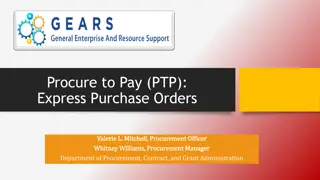
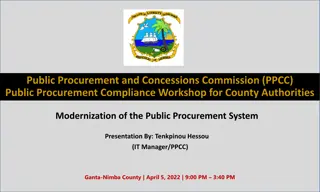
![Comprehensive Overview of Corruption Watch Submission on Public Procurement Bill [B18B-2023]](/thumb/138344/comprehensive-overview-of-corruption-watch-submission-on-public-procurement-bill-b18b-2023.jpg)
